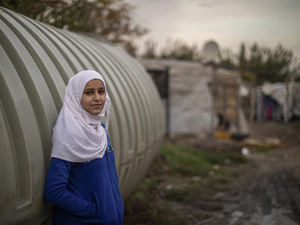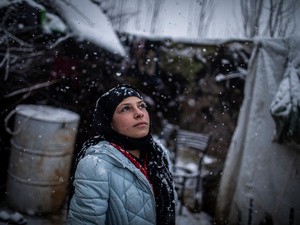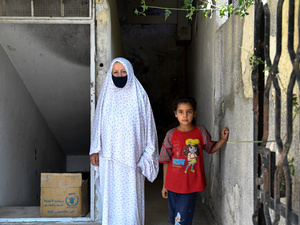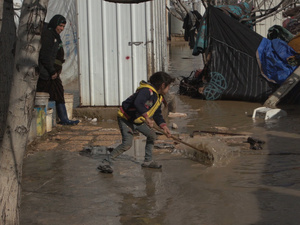UNHCR appoints Regional Refugee Coordinator for Syrian Refugees
UNHCR appoints Regional Refugee Coordinator for Syrian Refugees
With a rising number of refugees being reported in countries neighbouring Syria, UN High Commissioner for Refugees António Guterres has this week appointed Panos Moumtzis, previously UNHCRs Head of Donor Relations, as its Regional Refugee Coordinator for Syrian Refugees.
Moumtzis: March marks a year since the current turmoil in Syria started. Official data from surrounding countries and UNHCRs own registration figures indicate that around 30,000 people have fled to neighbouring countries while significant numbers of Syrians are thought to be displaced inside Syria. UNHCRs teams in Jordan, Lebanon and Turkey have been working for the past year to support the Governments and NGOs providing shelter, assistance and protection to the refugees.
The last six months have seen a significant increase in violence, particularly in the provinces of Homs, Deir al-Zor, Hama, Damascus and Idlib. Despite the difficult environment the policy and commitment of Syria to host and support 110,000 refugees registered with UNHCR, the majority from Iraq, remains unchanged.
To date, Jordan, Lebanon and Turkey have all maintained a policy of open borders for Syrians fleeing the violence. The bulk of assistance to refugees is being offered by the host countries and hosting communities.
UNHCR and Lebanons High Relief Commission (HRC) have jointly registered 7,088 Syrians in North Lebanon and registration is to continue in Tripoli where several thousand more are estimated to have taken refuge. They have mainly arrived from Homs and Talkalakh and reside with the local community in Wadi Khaled, Tall Bire, and Tripoli.
Additionally UNHCR and local partners estimate there are some 4,000 persons in the Bekaa valley. They are residing in Aarsal, Fakha, and Mashariie el Qaa. UNHCR is working to verify the current numbers and is carrying out distribution of food and other items. In other parts of Lebanon, an additional 1,000 Syrian refugees are receiving assistance from UNHCR and partners.
In North Lebanon, the HRC, UNHCR and partners regularly distribute food and basic domestic and hygiene items to registered refugees and host families in need. Primary health care is available through public and private clinics with UNHCR covering most of the costs. More serious conditions and the injured are referred to five different hospitals in the north, with the cost of care covered by the government. Some 268 wounded persons have been treated in various hospitals in North Lebanon since the beginning of the influx.
Refugee children have been able to enroll in local schools, with UNHCR and partners providing the costs of educational supplies and remedial classes - also offered to Lebanese children in need. At present, 525 Syrian children are enrolled in school. Working with partners, we hope to improve school attendance through a programme of remedial classes for Lebanese and Syrian children.
In the Bekaa, UNHCR, other UN agencies, along with local and international NGOs are providing assistance to the displaced. This includes fuel, food, blankets, mattresses and hygiene kits. UNHCR teams in the field are currently liaising with the authorities and assessing the needs of persons of concern and additional shelter capacities in the region.
UNHCR continues to be in regular contact with refugees and with the Lebanese authorities to follow up on all protection concerns.
In Jordan, over 5,000 Syrians have registered with UNHCR since March 2011, with a further 2,000 awaiting registration. Again, the majority are living with host families, from Irbid and Ramtha in the North, to Amman and as far south as Maan.
UNHCR is providing assistance to urban refugees (including cash grants and aid items), and is assisting the government in renovating and running a transit facility at the Ramtha border. The centre has seen over 1,000 Syrians transit through it, and currently houses over 380 people in very cramped conditions.
As with Lebanon, in Jordan local NGOs, in particular the Jordan Hashemite Charity Organization (JHAS), are playing an important role in responding directly to needs, and in referring vulnerable Syrians to UNHCR for registration and community services support. Access to healthcare is a key concern for Syrians; UNHCR, the UN country team and government are working together to provide these services. JHAS is distributing vouchers for food and essential items such as stoves, blankets and mattresses. JHAS also has a mobile clinic making regular visits to Ramtha and Mafraq, with the government also covering the cost of medical treatment in Mafraq.
In Turkey, where the camps are being managed by the Government, almost 23,000 persons have received protection in seven camps in Hatay province since April 2011. Some of this population has returned to Syria and today the total camp population numbers over 13,000 refugees. The Government of Turkey plans to move the majority to Kilis province, where a purpose-built container city has been prepared. UNHCR has established a permanent presence in Hatay to support the efforts of the Government, with a plan to establish an office in Kilis when the camp population moves there.
The Turkish government is providing the majority of assistance to the refugees. Primary health care is provided in the camps, and anyone with a more serious medical need is treated in the hospital in Antakya. All medical services are free of charge, including prescriptions, optical and dental care.
There are 68 classrooms established in the camps with Arabic speaking teachers. Each camp has community representatives. Registration and documentation is ongoing, with UNHCR offering assistance to the authorities in enhancing quality and content of the registration data.
Inside Syria itself, Iraqi refugees report a significant increase in the price of basic commodities, due to inflation and the devaluation of the Syrian pound, now around 50% of what it was last in March last year. UNHCR continues to support more than 11,000 of the most destitute refugee families through its financial assistance programme (with an average contribution of US$180 per family per month) and from March the office will help meet the food needs of approximately 97,000 refugees through a cash assistance-ATM programme. Together with the Syrian Arab Red Crescent and other national and international partners a number of basic services are also provided to help the refugee population to cope with an increasingly difficult socio-economic situation.
UNHCR has observed that refugees and Syrians have moved out of areas of unrest, with many choosing villages at the outskirts of the main cities, as well as rural Damascus and Damascus Governorate itself, that are considered more secure.
For further information on this topic, please contact:
In Beirut, Dana Sleiman on mobile +961 3 827 323
In Geneva: Adrian Edwards on mobile +41 79 5579120
In Geneva: Sybella Wilkes on mobile +41 79 557 9138












